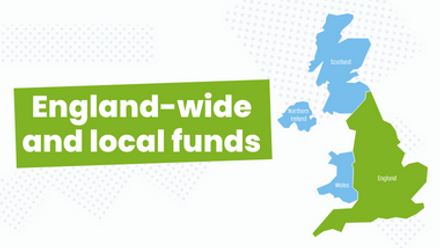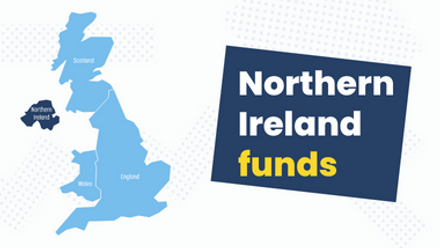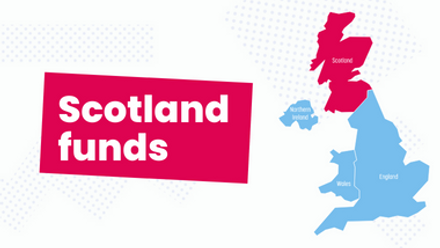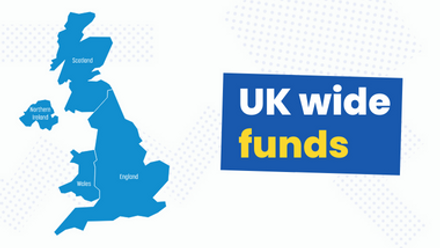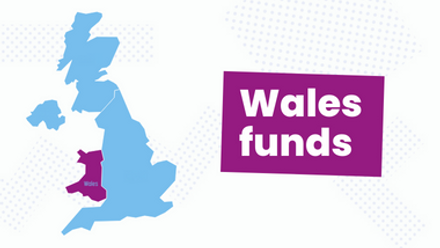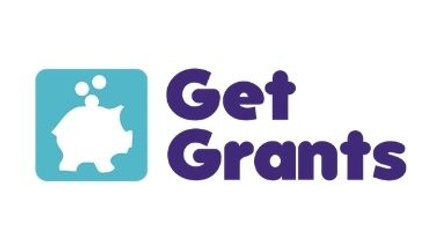Fundraising

Do you want to build your skills around writing funding bids?
Whether you're just starting out or looking to dive deeper into the details, this course covers it all. Learn at your own pace, on your own schedule, with a comprehensive guide that will walk you through the entire process of crafting successful funding bids. Empower yourself with the knowledge and skills to make a real impact!
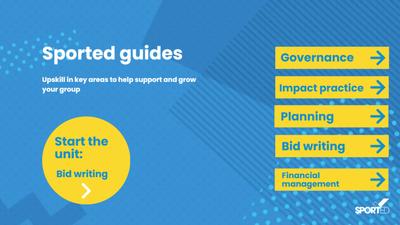

Getting started
Your journey to raising funds starts here with a quick start guide to what you need and how to get going.
For a look at the types of funding and grants available, and information on how to get your fundraising journey started, take a look at these introductory resources.
You can also request a personalised support package with a Sported volunteer.
Get set
If your organisation has decided to seek funding and are at the start of the journey, you will need to have some things in place first, the grant you are applying for will tell you what they require, different funders will have different requirements and qualifying restrictions.
Use this checklist to organise what you need to do, read the application information and add/delete the steps you will need to complete to apply. By assigning a date and responsible person to each step you can clearly see what you will need to do to apply for the funding.
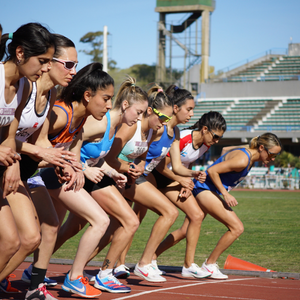
Vision and mission
Having a clear vision, mission and purpose for your organisation can help you to present to funders and keep focussed on what is important to your group.

Vision and mission task

Add your mission and purpose

Sported's vision, mission and purpose
Have a go at this task to visualise and record your group's vision, mission and purpose.

Good governance
Before thinking about fundraising, all groups, whether a registered charity, voluntary organisation, sports group or social enterprise should have the following:
- A governing document that sets out your aims, objectives, rules, procedures for meetings, membership guidelines and your committee structure. It should refer to financial management and have a dissolution clause. The group must hold a signed and dated copy (should be reviewed and signed annually)
- A safeguarding policy that covers children and adults-at-risk of protection issues. It should outline procedures and name a Safeguarding Officer.
- A bank account in the name of the group. Withdrawals should require at least two signatories from individuals who are unrelated.
- Annual accounts that refer to restricted, unrestricted and designated funds.
You can learn more in the Governance and planning pages, and also request volunteer support with Governance.

Budget and cashflow forecast
Paired with the action plan, should be an annual budget or cash flow forecast. At a basic level, you should identify your income expectations and your expected expenditure. This will help you to build reserves, fundraise for any shortfalls and identify growth. You can break it down into:
- Core costs – for ongoing running costs, staffing, overheads, etc.
- Revenue funding – for activities, sessions and projects
- Capital funding – for major items of equipment or to build or refurbish facilities
Larger groups should draw up an income generation plan identifying where funds will be drawn from, which fundraising activities are required, who will take on which roles, which approach funding you will take for particular projects and timescales for getting involved. Smaller groups can agree how to progress amongst the volunteers available and on a project-by-project basis.

Action plan
Even the smallest group needs to have some form of an action plan for the year. It doesn’t have to be overly complicated. But, your committee and/or group leaders should agree on plans that are realistic, achievable and within the aims and objectives set out in the constitution.
- What do you want to do?
- Why?
- Who will deliver it?
- Who is it for?
- How much will it cost
You can find out more from the Governance and planning pages, and also request volunteer support with planning.


Finding funding
With the basics in place, it's time to look for the right funding for your group. There are many potential funders out there, and the grants landscape can be daunting. Our resources will guide you in the next step of your fundraising journey.
Here at Sported, we send you our funding bulletin, as well as flagging up relevant funds and offering you the opportunity to 'Meet The Funder' at our online events.
Finding the right match for your project can be challenging. Remember, many funds receive a large number of applications. To maximise your chances of success, ensure your project meets the funder's criteria - and showcases the return you'll achieve from their investment.
If your funding request is not covered by any of the main funders, you can request a bespoke funding report from Sported.
Funding bulletins
By joining the Sported network you are eligible and automatically signed up to receive our monthly funding bulletin.
The bulletin is full funds of diverse and relevant to sport for development groups. It includes signposting for deadlines, key fund information and the relevant websites.
What can you use these funds for?
- purchasing equipment
- capital development/alterations to building or land
- project activities
- ongoing costs (e.g. rent, utility bills, staff costs)
- and more
Aren't seeing it in your mailbox? Check your spam folders and then get in touch with us. We will get you set up in no time.
Meet the funders

Applying for funding
Next up, you'll want to write the best application you can. We regularly run webinars on application writing, and have resources and videos to check out.
This information pack has detailed information on types of grants
Writing your application
Getting started with funding applications can be daunting, take a look at these top tips to get you going, then look at the more detailed resources below.
5 top tips for fundraising
Take a deep breath and read these top 5 tips before you start.
1. Make sure you meet the criteria before you start
The “scattergun” approach of sending the same request to different funders rarely works. However good your group is, if you don’t meet the criteria, you won’t be funded. If in doubt, check, and save
your valuable time.

2. Go through all the questions before you start
Make sure that you put the right information in the right place – don’t duplicate information or repeat yourself.
If the funder has attached advice notes, read these thoroughly as these will tell you what information they are looking in response to each question.
Short and precise answers will be appreciated by the person reading the application rather than being too long winded - you can always tell them that later!
3. Be factual and avoid grand claims

If we met and I asked what your group did, you probably wouldn’t tell me you enhanced the lives of young people through physical exercise and increased well-being - you would proudly say you ran a successful (insert your activity here) group.
Funders need to know the basics: who you are, what you do, where you meet, how often, how many take part, who they are and where they come from – and then, importantly, why and how you makes a difference in young lives.
Be realistic about these claims and remember you will need to show you achieved them if you get the grant. A weekly discussion on healthy eating will probably not combat obesity in the whole of your region, but it will raise awareness of lifestyle choices and you can monitor this through questionnaires.
4. Ask for what you need – not what you can apply for

A good budget is an indication that you know what you want and why – and that you understand project budgets, so avoid generalised estimates adding up neatly to the maximum you can apply
for. Breakdown your costs; such as hourly rates for sessional training or pitch fees, the costs of coaching badges etc., and refer quotes for larger items of equipment or capital expenditure.
5. Get a fresh pair of eyes on it before hitting send

You’ve finished….but before you hit the send button, ask someone to read it through. Did you put xxx and mean to go back to one of the answers? Did you leave out something obvious? Does it make sense? Do the figures add up? A fresh pair of eyes can really help – make sure they’ve also ready the guidance so they know what the funder is looking for. Press send and good luck!
You can also request volunteer support with applying for funding

Improving your bid
As you continue your funding journey, you may find that some funders require evaluations, impact reports, monitoring and evaluation. Some funders will require evidence that you have policies in place - in particular safeguarding and equality policies. Funders may also request information about how you are linked with your community and you may need to provide evidence of community needs and consultations. These resources are for those next steps, supporting and improving your fundraising efforts.

Impact practice
Simply put, your impact is the difference you make.
It is the broad and/or long-term effects of your activities. This can include the effects on direct users of your services, the effects on those who are not direct users (e.g. siblings, friends), and the effects on the wider community (e.g. governmental policy, public health).
Impact practice is the range of activities that a group carries out to focus on its impact. Or to put it another way, all the things you do to put your impact into practice.
It is much broader than monitoring and evaluation and includes activities such as...
- Designing the desired impact
- Planning how to measure it
- Collecting information about it
- Making sense of that information
- Communicating it and learning from it.


Directory of useful links
The Club Matters pages explain how to generate income using membership fees.
Generating income and revenue (sportenglandclubmatters.com)
For Cost of Living funding programmes, take a look at the Sported page.












